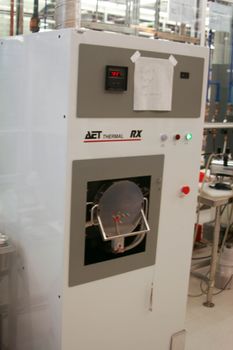Difference between revisions of "Rapid Thermal Processor (AET RX6)"
Millerski w (talk | contribs) (Updated SOP) |
|||
| (16 intermediate revisions by 6 users not shown) | |||
| Line 1: | Line 1: | ||
| − | {{ |
+ | {{tool2|{{PAGENAME}} |
|picture=RTP.jpg |
|picture=RTP.jpg |
||
|type = Vacuum Deposition |
|type = Vacuum Deposition |
||
| − | |super= |
+ | |super= Bill Millerski |
| + | |super2= Tony Bosch |
||
|phone=(805)839-3918x210 |
|phone=(805)839-3918x210 |
||
|location=Bay 3 |
|location=Bay 3 |
||
| Line 9: | Line 10: | ||
|manufacturer = Plasma-Therm |
|manufacturer = Plasma-Therm |
||
|materials = |
|materials = |
||
| + | |toolid=42 |
||
}} |
}} |
||
| − | = |
+ | =About= |
| − | Our rapid thermal annealer is manufactured by AET. Heating is achieved through two banks of heat lamps that deliver optical energy through the all-quartz chamber. With this unit, |
+ | Our rapid thermal annealer is manufactured by AET. Heating is achieved through two banks of heat lamps that deliver optical energy through the all-quartz chamber. With this unit, atmospheric pressure anneals in Oxygen, Nitrogen and Forming Gas can be done to temperatures up to 1200°C for three minutes. An inner liner is used to prevent contamination to the main quartz chamber. A thermocouple and pyrometer are available for maintaining temperature control. The system can hold one 4-inch wafer or smaller substrates placed on top of a Silicon carrier wafer. Custom windows based control software has been added to the system by Sedona Visual Controls. All process parameters are monitored and stored. Typical anneals are done for: ohmic contact formation to semiconductors, implant activation, damage annealing, dopant activation, and film densification. A variety of materials can be annealed in the chamber, including Si, SiO<sub>2</sub>, Si<sub>3</sub>N<sub>4</sub>, GaAs, InP, GaSb, GaN, and metals. For materials that will decompose at the elevated temperatures, a dielectric anneal cap must be deposited on the wafer or an enclosed wafer holder must be used to prevent contamination of the chamber walls. |
| − | = |
+ | =Detailed Specifications= |
| − | *Temperatures of 1000°C for 20 min., 1100°C for 5 min., 1200°C for |
+ | *Max. Temperatures of 1000°C for 20 min., 1100°C for 5 min., 1200°C for 3 min. |
| + | *Maximum ramp rate of 50°C/Sec. |
||
| + | *Oxygen, Nitrogen and Forming Gas flows up to 10LPM. |
||
| + | *TC use for anneals up to 1200°C |
||
*Windows-based process monitoring and control software by Sedona Visual Controls |
*Windows-based process monitoring and control software by Sedona Visual Controls |
||
| + | =Documentation= |
||
| − | =Max temp/Time= |
||
| + | *[https://wiki.nanotech.ucsb.edu/w/images/0/0b/RTA_AET_Operating_Instructions.pdf Operating Instuctions] |
||
| − | {| border="1" class="wikitable" style="border: 1px solid #D0E7FF; background-color:#ffffff; text-align:center;" |
||
| − | |- |
||
| − | |width="100"|Temperature||width="75"|Time |
||
| − | |- |
||
| − | |1000°C || 1 Hour |
||
| − | |- |
||
| − | |1100°C||10 min |
||
| − | |- |
||
| − | |1200°C ||3 min |
||
| − | |- |
||
| − | |1300°C|| 10 sec |
||
| − | |- |
||
| − | |} |
||
Latest revision as of 08:58, 15 June 2023
| ||||||||||||||||||||||||||||||
About
Our rapid thermal annealer is manufactured by AET. Heating is achieved through two banks of heat lamps that deliver optical energy through the all-quartz chamber. With this unit, atmospheric pressure anneals in Oxygen, Nitrogen and Forming Gas can be done to temperatures up to 1200°C for three minutes. An inner liner is used to prevent contamination to the main quartz chamber. A thermocouple and pyrometer are available for maintaining temperature control. The system can hold one 4-inch wafer or smaller substrates placed on top of a Silicon carrier wafer. Custom windows based control software has been added to the system by Sedona Visual Controls. All process parameters are monitored and stored. Typical anneals are done for: ohmic contact formation to semiconductors, implant activation, damage annealing, dopant activation, and film densification. A variety of materials can be annealed in the chamber, including Si, SiO2, Si3N4, GaAs, InP, GaSb, GaN, and metals. For materials that will decompose at the elevated temperatures, a dielectric anneal cap must be deposited on the wafer or an enclosed wafer holder must be used to prevent contamination of the chamber walls.
Detailed Specifications
- Max. Temperatures of 1000°C for 20 min., 1100°C for 5 min., 1200°C for 3 min.
- Maximum ramp rate of 50°C/Sec.
- Oxygen, Nitrogen and Forming Gas flows up to 10LPM.
- TC use for anneals up to 1200°C
- Windows-based process monitoring and control software by Sedona Visual Controls
